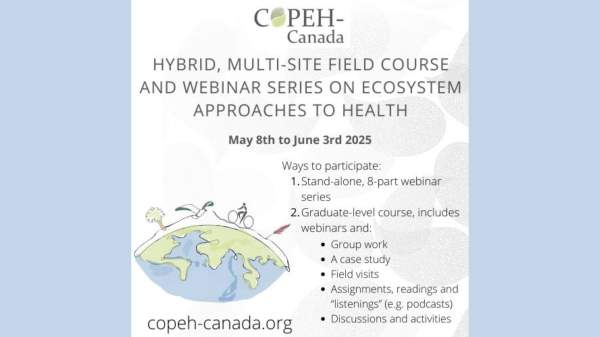Hybrid, Multi-Site Field Course on Ecosystem Approaches to Health

Discover innovative and dynamic approaches for better understanding the multiple factors that influence health—ecosystem approaches to health—with an experienced, pan-Canadian team. During this intensive course you will learn methods for carrying out research and interventions on issues at the nexus of health, ecosystems, equity, and society. In a time of an unprecedented polycrisis, connections are more important than ever. Our course is designed to build relationships that can heal.
This course is available to graduate students* from all disciplines and also to professionals interested in these themes. Students from all universities are welcome to register. It is possible to register for the full course at participating universities, with credits transferred, or for the webinars only**.
Objective. The overall objective of this course is to provide participants with a working knowledge of ecosystem approaches to health, such that they can integrate the principles into their own work, as necessary, and to build relationships with land and among individuals with common interests in safeguarding a habitable future.
Theme: Each year, activities revolve around a theme, which, this year, is “Reciprocity, land, and health.”
Content
- A stand-alone webinar series: This webinar series covers the main orientations of the Ecosystem approaches to health (complexity/systems thinking, transdisciplinarity, (ecosystem) sustainability, social and gender equity, participation, and knowledge to action).
- The graduate-level courses include:
- the webinar series (see above);
- discussions and workshops on webinar topics;
- group work on a land-based case study with field components;
- activities to help students integrate new knowledge into their own projects (for example a thesis or an intervention); and
- assignments, readings, and “listenings” (e.g. podcasts), both required and suggested.
Format. There are two ways to participate: as a student in one of the full credit graduate courses held at three universities, the Institut national de la recherche scientifique (INRS), the University of Guelph, and the University of Northern British Columbia (UNBC), or as a participant in the eight-part webinar series (not for credit, a certificate is provided).
Schedule. The webinars run on Tuesday and Thursday from 1 PM–3 PM Eastern Time from May 8–June 3. Each university has its own schedule for the remainder of the full course content, including land-based learning with field visits.
For more information or to register, contact us: copehcanada@gmail.com



